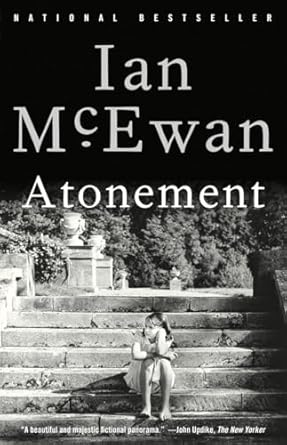
Buy On Amazon
 The Guardian The 100 greatest novels of all time
The Guardian The 100 greatest novels of all time
 Time Magazine All-Time 100 Novels
Time Magazine All-Time 100 Novels
 The Telegraph The 100 Best Books
The Telegraph The 100 Best Books
 Booker Prize Shortlist
Booker Prize Shortlist
Likes
0
Want to Read Shelf
1
Read Shelf
0
Atonement
Ian McEwan
Ian McEwan’s Atonement is a novel deeply concerned with the interplay between narrative, perception, and the devastating consequences of misinterpretation, constructed through a precise and layered semantic structure that mirrors its exploration of guilt, memory, and the unreliability of storytelling. The novel’s language is both lush and meticulously controlled, shifting in tone and texture to reflect the consciousness of its central figures, most notably Briony Tallis, whose youthful misunderstanding sets in motion a tragic series of events that alter the lives of her sister Cecilia and Robbie Turner irreparably. McEwan employs a semantic framework that plays with the tension between what is seen, what is assumed, and what is ultimately unknowable, crafting prose that oscillates between detailed realism and an almost self-consciously literary quality that highlights the constructed nature of both Briony’s world and the novel itself. Themes of atonement and self-reckoning are embedded within the very language of the book—words are not neutral conveyors of truth but instruments of both clarity and distortion, as Briony’s attempt to impose order upon the world through storytelling leads to irreversible damage. The semantic layering of Atonement is further complicated by its metafictional structure, where McEwan blurs the lines between fiction and reality, forcing the reader to question whether atonement can ever truly be achieved through narrative reconstruction. This thematic ambiguity is reinforced by McEwan’s use of shifting perspectives and temporal disjunctions, where meaning is constantly recontextualized, revealing the fragile, mutable nature of memory and interpretation. The novel’s engagement with World War II serves as both a literal and symbolic backdrop for its exploration of trauma, loss, and the inadequacy of language to fully encapsulate human suffering, and McEwan’s prose reflects this by alternating between detached, clinical precision and moments of haunting lyricism that evoke the inescapable weight of history. At its core, Atonement is an inquiry into the ethics of storytelling itself, exposing the moral responsibility inherent in shaping narrative and questioning whether any act of creation—whether literary or otherwise—can ever truly amend the past. McEwan constructs a world where words are both weapons and salves, where language can destroy just as easily as it can attempt to heal, and where the ultimate atonement may lie not in achieving redemption but in acknowledging the limits of one’s own narrative control. Through its intricate semantics and relentless interrogation of truth, Atonement becomes not just a story of personal guilt but a meditation on the broader human need to rewrite and reshape reality, even when the truth remains elusive, forever just beyond the reach of words.